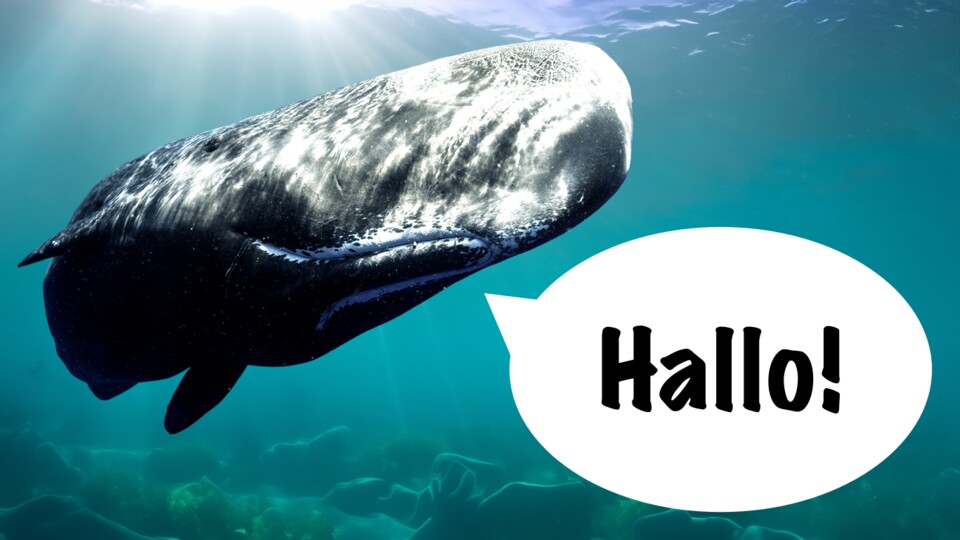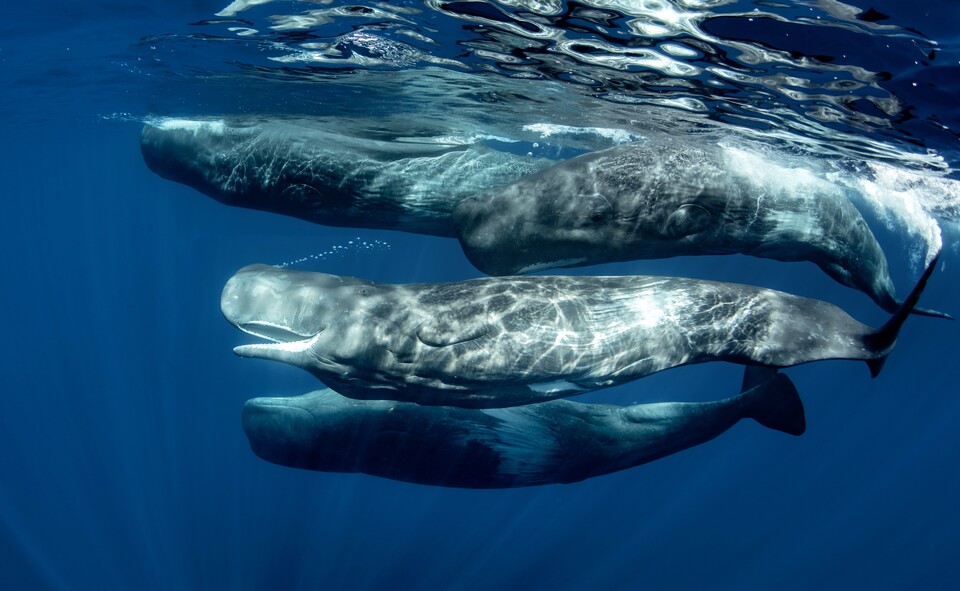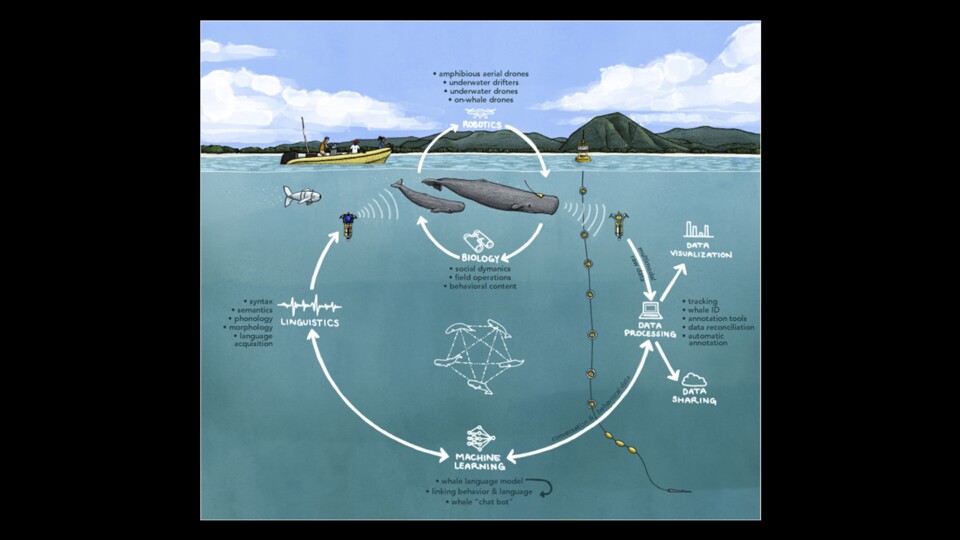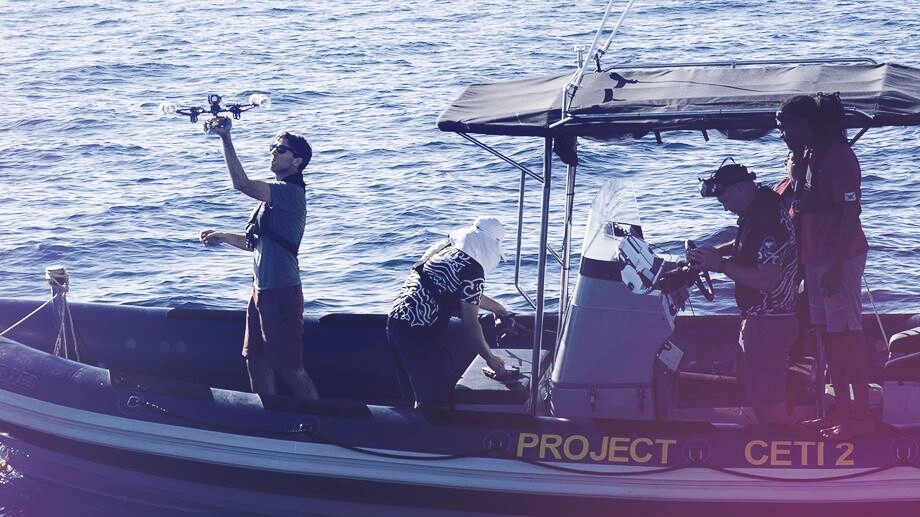
The ambitious goal of the Project CETI researchers: Communicate with sperm whales. (Image: Project CETI)
Advertisement
Since the beginning of human history, we have dreamed of communicating with the other inhabitants of our planet.
From the earliest cave paintings that show humans and animals side by side, to the mythical stories in which animals speak and share wisdom, the arc of this ancient desire spans.
Of all these fascinating creatures, sperm whales perhaps hide the biggest secret. These giants of the sea use a form of communication that may be similar in complexity to our own language – a mystery that remains unsolved to this day.
Now the dream could finally become reality – thanks to AI. Advances in machine learning suddenly offer unprecedented possibilities for translating unknown languages.
Advertisement
What was once considered the domain of fantasy is now on the doorstep of reality thanks to AI: direct communication between humans and animals.
AI generated content
the essentials in brief
- Sperm whales use complex communication similar to our language
- CETI research project uses AI for language translation
- Mass amounts of data are collected to train AI models
- Challenges: data acquisition, concepts without comparability, ethical concerns
- Goal: Understanding and communicating with sperm whales for conservation and research
How do sperm whales communicate? Speak one Language
?
Sperm whales actually use a complex form of communication called Language
can be designated. This consists of a variety of clicks, pauses and patterns.
Researchers suspect that each Word
consists of a clearly defined sequence of these clicks – these are referred to as Coda.
Simply put, sperm whales use a language that could be compared to our Morse language.
The whales use this click language to communicate socially and convey information within the group.


Sperm whales live in groups and clans. Many of them have their own dialect. (Image: Willyam via Adobe Stock)
Interestingly, research has shown that sperm whales even have dialects that can vary by region and group.
Some scientists even believe that it is Sperm whale cliques there is one that has its own slang
have developed because the ocean giants like us adopt the way of speaking of like-minded people.
Even more surprising is the fact that young sperm whale babies have to learn the complex language of their family – just like human babies. It takes them about two years before they can speak properly. Before that, they just babble in unintelligible baby language.
For these reasons, scientists suspect that the language of sperm whales may have a similar complexity to ours – and it is now being translated.
How researchers are now using AI to decode language


This is what Project CETI's approach looks like in a picture. (Image: Sciencedirect)
The non-profit company was responsible for decoding and translation Project CETI created by David Gruber and Shane Gero. Today it consists of over 50 scientists, including AI experts, roboticists, marine biologists and linguists.
First, data must be collected: For more than 20 years, Shane Gero has been taking his boat out to sea and recording the conversations of sperm whales with an underwater microphone. Although he has already been able to collect a lot of data, he is faced with a problem that he calls the dental practice problem.
If a linguist spends years recording a language in only one place, such as a German dentist's office, one might come to the conclusion that the word Root canal treatment
is a cornerstone of the German language.
Project CETI aims to dramatically increase data collection. Drones, robot fish and hundreds of stationary underwater microphones are used to record the sperm whale codas.
Thanks to the research project, 400,000 times more data can be collected than Gero was able to do in a year alone.


Project CETI researchers fly a drone to collect data. (Image: Project CETI)
What happens to the data?
The countless sperm whale conversations will be used to train an AI language model. You can think of it like ChatGPT, which was trained on a huge amount of human language.
In the past, it was almost impossible to translate a language into another that we know nothing about and with which there is no comparison. That has changed with advances in machine learning.
Instead of trying to translate one word into another, the AI language models can look for patterns.
The word king
There is a similar correlation to the word in every language queen
have. Or Hot
becomes the opposite of in every language Cold
be. The goal of Project CETI is to identify these similarities in order to make them understandable in human language.
The hoped-for end result of Project CETI
We understand the language of sperm whales and may even be able to communicate with them. In this way we can better ensure the continued existence of the ocean giants and learn more about the intelligent animals. The research results could be applied to decoding other animals in the future.
David Gruber, one of the two founders of Project CETI, explains his vision for the ambitious science project in this YouTube video on the TED channel:
Link to YouTube content
What problems are there?
A huge amount of data is required: One of Project CETI's biggest challenges is collecting data. Not only is it logistically challenging because sperm whales live in the oceans and don't exactly fill libraries with books, but also in terms of quantity.
In order for ChatGPT to work so well, it had to be trained on billions of words. The CETI researchers face the major challenge of collecting enough sperm whale conversations so that their language model can theoretically learn the language of whales.
Understanding concepts for which we have no concept: The next big challenge is translating sperm whale language into ours. The big problem with this is that it is very likely Words
there are things that make no sense to us humans or for which we have no concept.
And the other way around: We can't ask a whale how long it took him to swim a certain distance if he doesn't have the same understanding of time as we do.
It is then the language model's job to find patterns that might suggest what a word might mean and whether there is an overlap with human language.
Ethical concerns: When it comes to whales, researchers can collect data quite reliably without having to interfere too much with the animal's ecosystem. But how can you test a possible AI translation without playing the recording to the whales? What if it contains errors and the animals change their behavior as a result?
Could future whalers abuse AI to illegally hunt marine mammals? Who should even be allowed to talk to the whales? Questions like these are still completely open and unanswered.
The last thing any of us want to do is end up in a scenario where we look back and say, as Einstein did: If I had known better, I would never have helped with the bomb.
Shane Gero, co-founder of Project CETI.
But the project is still very exciting and remarkable. You can find more interesting articles from the field of science here:
What do you think about Project CETI? Do you think sperm whales have a language that rivals ours in terms of complexity? And if so, what possibilities would that open up if we understood them? Should we communicate with them or is that perhaps a bad idea? Feel free to write us your opinion in the comments!